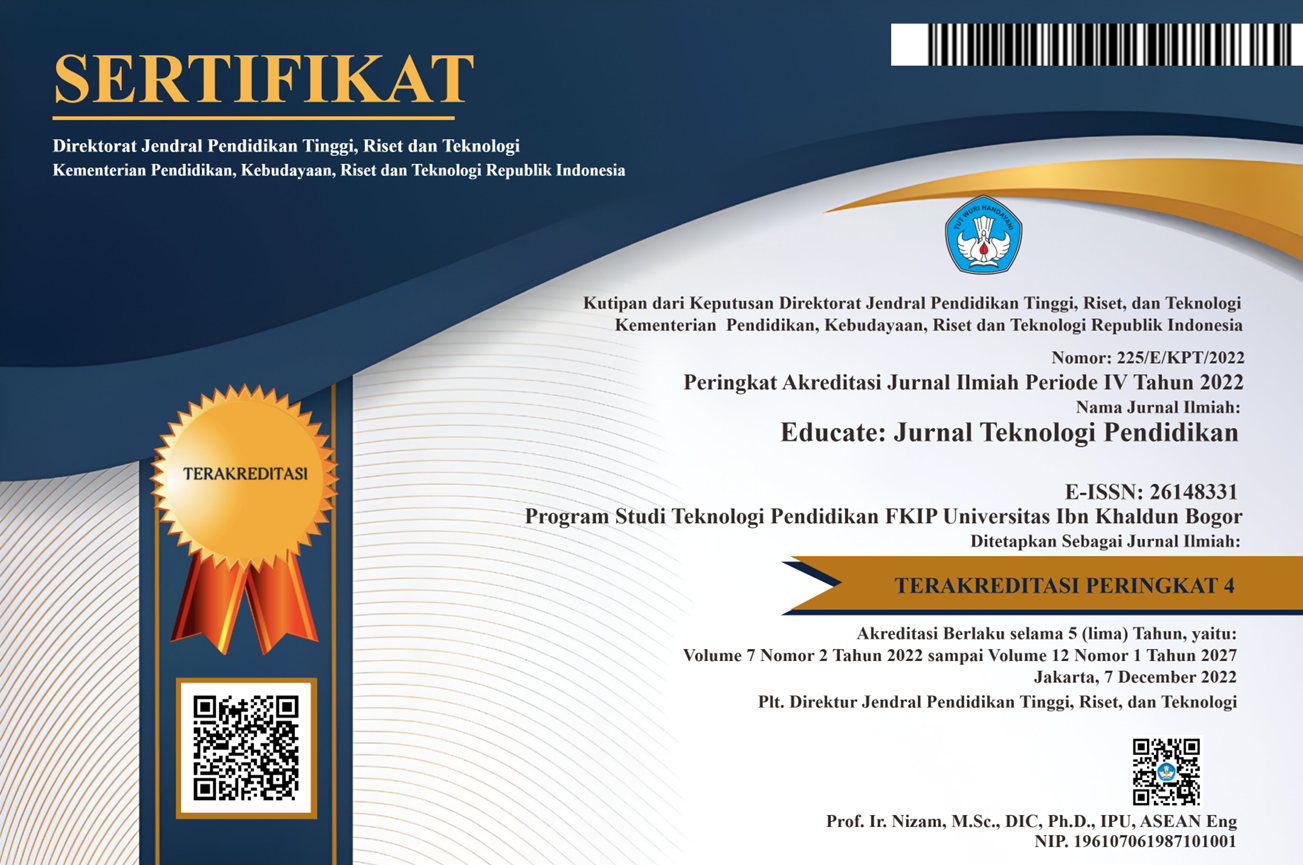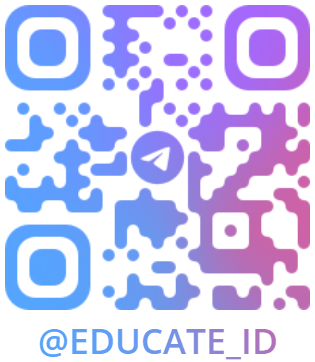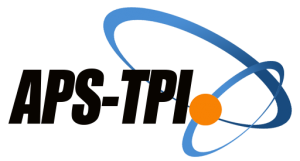ADAB IN LEARNING TOWARDS THE ATTITUDES AND LEARNING OUTCOMES OF EDUCATIONAL TECHNOLOGY PROGRAM STUDENTS
ADAB DALAM PEMBELAJARAN TERHADAP SIKAP DAN HASIL BELAJAR MAHASISWA PRODI TEKNOLOGI PENDIDIKAN
DOI:
https://doi.org/10.32832/educate.v9i1.15839Keywords:
Adab in Learning (Al Qur'an - Hadith Approach), Student Attitudes, Learning ResultsAbstract
Adab in this context refers to the principles, ethics, social norms and etiquette applied during academic interactions. Manners in learning have potential problems: (1) incompatibility between learning etiquette and the use of technology, (2) the influence of attitudes towards the use of technology, (3) the influence of ethics in learning educational technology, (4) the impact on the quality of learning outcomes, (5) differences in attitudes and learning outcomes between students. On this basis, in-depth research is needed with the aim of investigating and determining corrective action so that the implementation of Etiquette in the Foundations of Educational Technology course on student attitudes and learning outcomes does not happen again. Next, innovation is needed in the form of; (1) development of educational technology ethics guidelines, (2) development of learning models that integrate manners and technology, (3) development of attitudes and ethics evaluation tools, (4) use of innovative technology in the learning process. This research uses descriptive quantitative methods, data is processed using descriptive - inferential statistical techniques through regression analysis. The population and research sample were all 24 students taking the Foundations of Educational Technology course. The results of the research can be presented: (1) Manners in learning the Foundations of Educational Technology with a strong category, namely 0.715 in forming attitudes, (2) Manners with a weak category, namely 0.292 for increasing learning outcomes (3) Attitudes with a weak category, namely 0.329 for increasing learning outcomes. In conclusion based on these data, further research is recommended to increase the Adab dimension and Attitude dimension so that Learning Outcomes increase. For future researchers, they can compare manners and attitudes, which is stronger in increasing learning outcomes.
References
Abdullah, Abu, Muhammad bin Ismail al-Bukhari ; penerjemah, Subhan Abdullah, Idris, Imam Ghazali; editor, Nanang Ni'amurrahman, Solihin, Luthi Arif, 2012, Ensiklopedia hadits shahih al-Bukhari 2, Jakarta, Penerbit: Almahira
Ahmadi, Abu dan Supriyono, Widodo, 2004, Psikologi Belajar, Jakarta: PT. Rineka Cipta, h. 138-147
Al Quran, 2021, Mushaf An Nur Al Qura’nul Karim, Al Fatih
Allport, Gordon. W, 1949 edisi pertama, Personality : a psychological interpretation /, Penerbit: London Constable & amp, company
Arikunto, Suharsimi, 2006, Prosedur Penelitian: Suatu Pendekatan Praktik, Edisi Revisi VI, Jakarta: PT. Rineka Cipta
At-Thursidi, Ahmad Maisur Sindi. 1997. Tanbihul Muta’allim. Toha Putra: Semarang
A.W. Munawwir, Kamus Al-Munawwir Arab-Indonesia Terlengkap, Surabaya: Pustaka Progressif, h. 462.
Bandura, Albert , 1977, Social Learning Theory, Prentice-Hall, Penerbit: General Learning Press
Bruner, Jerome, 1990, Edisi pertama, Acts of Meaning (Tindakan Makna), Penerbit: Harvard University Press
Darmawan, 2022, Sikap Siswa terhadap Mata Pelajaran Pendidikan Agama Islam di SLTPN 2 Bangkinang
Djaali, 2009, Psikologi Pendidikan, Jakarta: PT. Bumi Aksara, h. 115
Dewey, John, 1916, edisi pertama, Democracy and Education (Demokrasi dan Pendidikan).
Fu'ad Abdul Baqi, Muhammad ; penerjemah, Abu Firly Basaam Taqiy, S.Ag. ; editor, Abdul Bakir, S. Ag, 2017, Kumpulan Hadits sahih Imam Bukhari dan Muslim, Cetakan: pertama, Yogyakarta Penerbit: Lontar Mediatama
Gagne, Robert Mills, 1965, Edisi pertama, The Conditions of Learning (Kondisi Pembelajaran), Penerbit: Holt, Rinehart and Winston.
Gardner, Howard, 1983, edisi pertama, Frames of Mind: The Theory of Multiple Intelligences (Frames of Mind: Teori Kecerdasan Jamak), Penerbit: Basic Books
Hartono, SPSS 16.0, 2008, Analisis Data Statistik dan Penelitian, Yogyakarta, Pustaka Pelajar.
---------Statistik Untuk Penelitian, 2009, Yogyakarta, Penerbit: Pustaka Pelajar
--------- Analisis Item Instrumen, 2010, Bandung, Penerbit: Nusa Media
Kamus Besar Bahasa Indonesia (KBBI), 2016, Edisi 5; Badan Pengembangan dan Pembinaan Bahasa, Penerbit: P.T Balai Pustaka
Krathwohl, David R, 2002, “A Revision of Bloom’s Taxonomy: An Overview”, Theory Into Practice, Volume 41, Number 4, Autum. Ohio: College of Education, The Ohio State University
Maslow, Abraham H, 1954, edisi pertama, Motivation and Personality, Penerbit: Harper & Row
Muhammad, Imam Abu Isa, at-Tirmidzi (824–892 M), Kumpulan Hadits Tarmidzi, Penerbitan: Uzbekistan
Oxford English Dictionary (OED), Edisi ketiga. "Oxford English Dictionary Third Edition" (OED3). daring tahun 2000, Penerbit: Oxford University
Shihab, Muhammad Quraish, 2002, Tafsîr Al-Qur'an - Al Misbah, Penerbit: Lentera Hati.
Sulfiya , 2019, “Konsep Etika Murid terhadap Guru dalam Kitab Adab Al-‘Alim wa Al-Muta’allim dan Implementasinya dalam Membentuk Karakter Siswa”.
Sugiyono, 2016, Metode Penelitian Pendidikan: Pendekatan Kuantitatif, Kualitatif, dan R&D, Penerbit: Alfabeta
Sulaiman, Imam Abu Dawood ibn al-Ash'ath al-Sijistani (817–889 M), Kumpulan Hadits Dawuud, Tempat menyelesaikan kumpulan hadits di kota Basra, Irak.
Thurstone, Louis L, 1959, The Measurement of Values, Penerbit: University of Chicago Press
Vygotsky, Lev, 1934, edisi pertama,"Myshlenie i rech" (Мышление и речь) dalam bahasa Rusia.,Thought and Language (Pikiran dan Bahasa) dalam Bahasa Inggris,1962, edisi kedua, Penerbit: MIT Press
Yunus, Mahmud, 2007, Kamus Arab-Indonesia. Jakarta: PT. Mahmud Yunus Wa Dzurriyah, h. 37. 161
Downloads
Published
How to Cite
Issue
Section
License
Copyright (c) 2024 Nurhayati

This work is licensed under a Creative Commons Attribution 4.0 International License.
| Authors grant the journal copyright of the work licensed under CC-BY-SA or The Creative Commons Attribution–ShareAlike License that allows others to share the work with an acknowledgement of the work's authorship and initial publication in this journal. | Penulis memberikan hak cipta karyanya kepada jurnal yang dilisensikan dengan CC-BY-SA or The Creative Commons Attribution–ShareAlike License yang memungkinkan orang lain untuk menggunakan karya dengan pengakuan kepengarangan karya dan publikasi awal dalam jurnal ini. |









